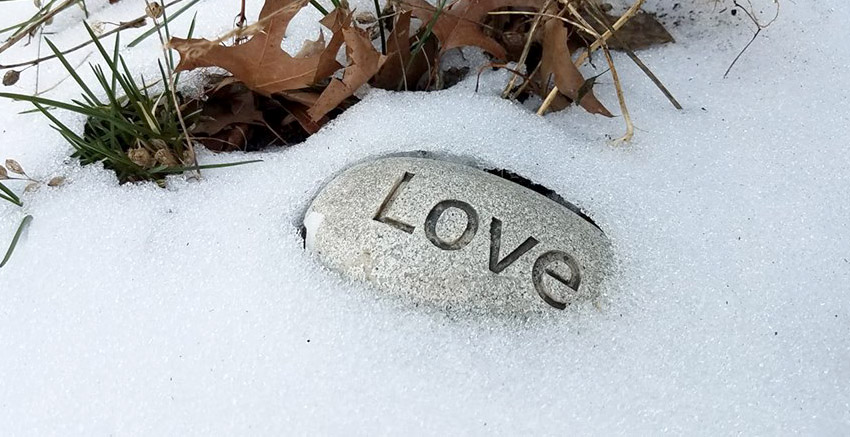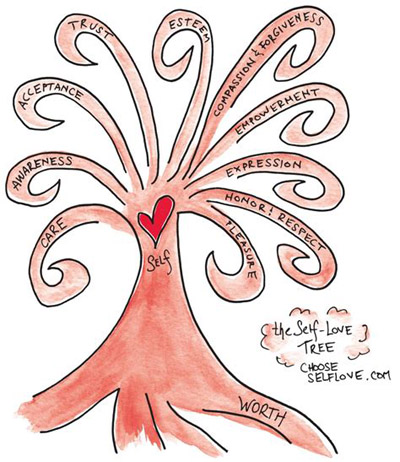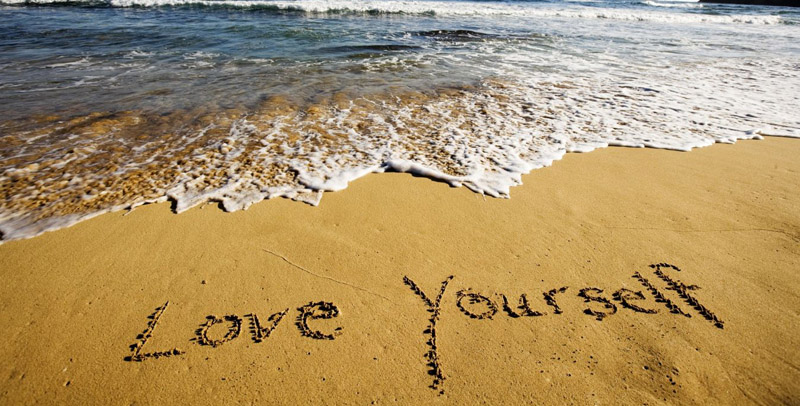Retrospective Intrusion: Valentine, Love Thyself

“Who looks outside, dreams; who looks inside, awakes.”
– Dr. Carl Gustav Jung, father of
Analytic Psychology
It was 2019, a little over a year before the pandemic, and this little piece garnered a good bit of commentary. Here on Valentine’s Day, five years later, we ask the questions; Is it still current? Is the data still valid? And, do I still agree with myself? Let’s find out Valentine!
I’m known for working hard, going the extra mile and pushing myself. I am maintaining around a 200-pound weight loss for over five years with a discipline about what I eat that frustrates some friends and family. I’m goal oriented, driven, seek to be the best me I can.
Boy, I’m awesome, right? I must love myself.
No on both counts. I joke to those who say “Wow, I wish I could have your…” by saying “Oh, you can. My success is based firmly in the knowledge of just how much I suck.” They laugh, I laugh, but it’s not totally a joke. I push myself and discipline myself because of the standards that I set for myself. Standards built to overcome my own self-perceived faults, weakness and history. Standards that might not be all together fair or kind. “We often believe that we do love ourselves,” writes Deborah Ward, a prominent English mental wellness author, “and yet our actions and reactions, and our lives, suggest otherwise” (Ward, 2014).
Already this is challenging to read. Not because of invalidity, but because of how much of a difference five years can make in one’s view of themselves. I still work hard, go the extra mile and push myself. But the discipline has dulled with continued effort. Could this be a self-love issue?
Even the idea of self-love is something that I’m adverse to. I’m a self-sacrifice guy. But I’ve had to learn over time that the best way I can give my best to others is by treating myself with love. To be clear, we’re still talking about an awareness of personal faults and putting others first at times, not indulgence, being vain or egotistical—though sometimes the term “self-love” still feels that way to me. Self-compassion carries less of an arrogant connotation. That’s something I can attempt, as I am compassionate. “Self-compassion and self-love are largely used interchangeably in specialized literature” according to an extensive Medical News Today article. “Many psychology studies attest self-love and -compassion are key for mental health and well-being, keeping depression and anxiety at bay. Research shows that having more self-compassion builds resilience in the face of adversity, helping people to recover more quickly from trauma…better cope with failure or embarrassment,” (Sandoiu, 2018).
We look at that list and say, “Yeah, I want all those benefits!” But perhaps you’re like me and the idea of self-compassion is challenging. Where do we even start? And, how do we avoid beating ourselves up when we fail at being self-compassionate?
Love, Compassion, Kindness
“Self-kindness entails being warm and understanding toward ourselves when we suffer, fail, or feel inadequate, rather than flagellating ourselves with self-criticism.”
– Pr. Kristin Neff, University of Texas
Professor Kristin Neff of the University of Texas and Pr. Germer of Harvard Medical School define self-love as having three-components (Sandoiu, 2018). Each one holds a path to greater self-love, but a balance of each one is best.
(2019 Me, why did you abbreviate Pr. Germer and not Professor Neff?)
Self-kindness – “Treating oneself with understanding and forgiveness.”
It’s hard for me to buy into self-love. I’m growing in self-compassion. But self-kindness? Yeah, I can be kind to myself, I can do that one. A help on my path has been that forgiving myself does not mean letting myself off the hook in terms of growth. I learn from my mistakes or poor choices while also being as kind to myself as I would be to a college or friend. Interestingly, showing myself that understanding actually helps me understand myself better! Thus, I’m less likely to fall into the same pattern again.

Recognition of One’s Place in Shared Humanity – “Acknowledgment that people are not perfect and that personal experiences are part of the larger human experience.”
But I want to be perfect! Yeah, we all do, often because perfection tends to equate to “painless.” A perfect person never fails, never struggles, never hurts. And never exists. Being human means making mistakes. Being human also means planning for your own needs. The human experience is one of effort and rest, pain and pleasure. Setting boundaries on your time, your work and your needy acquaintances are all forms of self-love that are achievable and will make you a better coworker, parent and friend. Planning time to do the things you enjoy, while balancing your responsibilities, is another way to care for yourself which will also have you return to those responsibilities recharged and ready to go.
Ah, the painlessness of perfection! This is a life-long core false belief of mine. This one I have worked on. I’m much more satisfied with “good enough” than I used to be. And I still love the tree of self-love!
Mindfulness – “Emotional equanimity and avoidance of overidentification with painful emotions.”
Oh, Mindfulness, is there anything you can’t do? Okay, I’m a bit sarcastic. I’m glad Mindfulness is everywhere these days. We need to be more present as a culture. In terms of self-love, Mindfulness takes on a balancing factor, here. Rather than the mindful focus, we’re encouraged to treat our self-downing, loss, guilt, shame and self-directed anger the same way we would treat distractions when meditating or focusing on a project. Acknowledge them, understand them, then let them flow away. That brings the emotional balance we need to be healthy. Also, for balance, “Mindfulness can help us to relearn, as adults, to take pleasure in fundamental, everyday things that we used to enjoy spontaneously as children,” experts say. “Reacquainting ourselves with pleasure in this way is an essential component of self-kindness.” This one was eye-opening to me, as a person who self-manages his weight. As adults we tend to overconsume because we’ve become dulled to the pleasures we’ve experienced for a lifetime. Remember the first time you had a piece of candy? A Dorito? Yeah, me neither. But I’ve been chasing that dragon ever since, so it must have been good. Slowing down, re-experiencing our pleasures, helps us feel satisfied sooner, with less.
Now this is a valuable note for me today from me of the past. I don’t know about you but I’ve been trying to fight the feeling that there is simply not enough time to do those things I used to relish as, well, mindfully. No time to write down my calories. No time to plan out my meals. No time to simply relax. To be. Perhaps that’s why–even though I’m still keeping off most of the weight above–that number has decreased. And I continue to fight to reclaim it. But maybe I shouldn’t fight. Maybe I should be kind to myself. Understand. Forgive. Let’s try…
“Me today, Valentine’s Day 2024, I understand that you, and all of humanity went through some tough stuff a few years ago. I know that the continued effort for the last near 15 years has worn down your discipline. I know that you’re tired. I am, too. I forgive you. Let’s get up from here and seek to enjoy those things that show ourselves and our body love more fully. Let’s hold on to nourishing pleasure and finally let go of the old pain. Love ya, dumbass.”
Let’s end this month of love with love to ourselves as much as others. If we’re not there yet, let’s be compassionate. If we’re just beginning, let’s be kind. It’s a great first step into the love affair with ourselves.
I didn’t expect that, but I think I needed it. It’s time. It’s time to start loving myself again–and as I’ve always said, love is a verb; it’s an action word. I think it’s clear that I still agree with my premise, the data holds up and the message remains vitally current–maybe even more in a post-pandemic world.
If your love affair with yourself may have taken a hit recently, or a long time past, feel free to do as I did above. I’m going to be re-reading that forgiveness note to myself a lot going forward. I need it. You can write one to yourself. Do it privately, of course, but know that the comment section or an email to me is always open if you’d welcome some support.
Much love to all, today.

__________________________________________________
Sandoiu, Ana (2018) Why self-love is important and how to cultivate it. Medical News Today. Retrieved from: https://www.medicalnewstoday.com/articles/321309.php
Deborah Ward (2014) 3 Ways to Learn to Love Yourself: Many of us believe we already do. Our actions say otherwise. Psychology Today. Retrieved from: https://www.psychologytoday.com/us/blog/sense-and-sensitivity/201401/3-ways-learn-love-yourself

 Previous Post
Previous Post